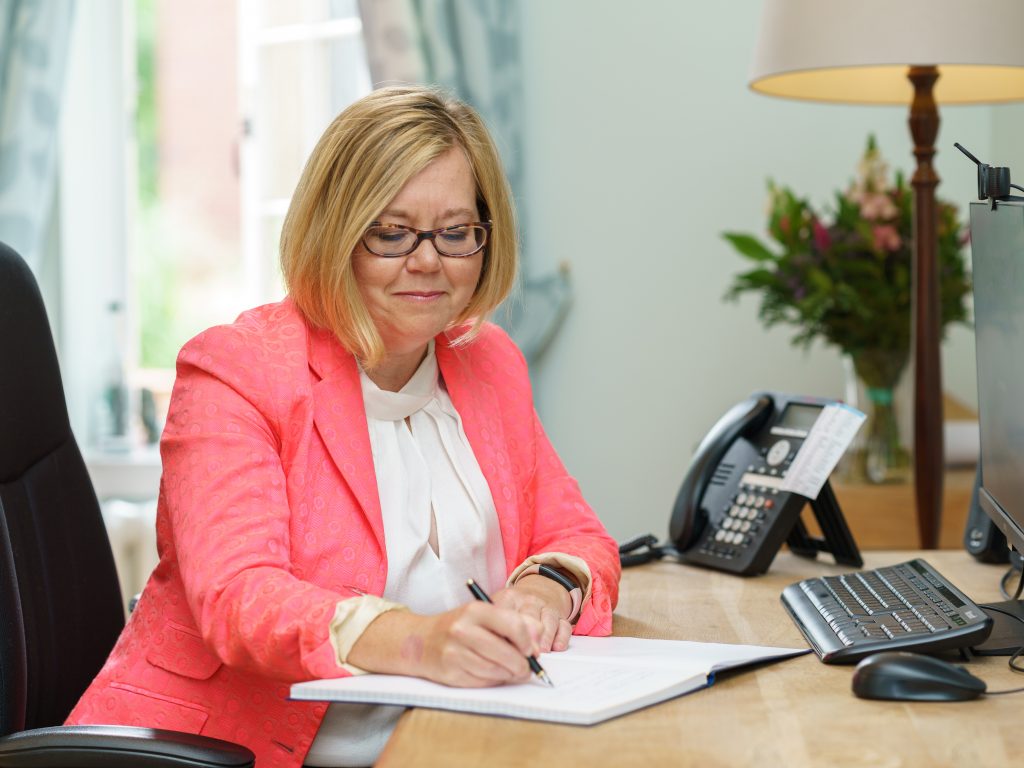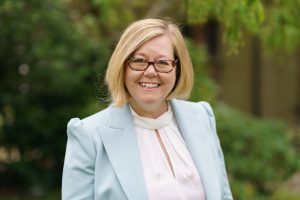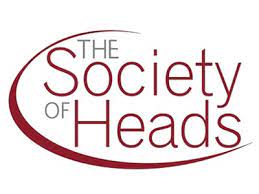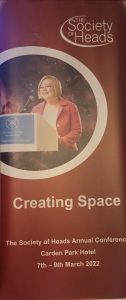‘A very warm welcome to the Society of Heads Conference 2022.
What a pleasure it is to welcome so many people in person. We also welcome people joining us online.
We last met for conference shortly before the first lockdown in March 2020. Since then we have climbed the mountain of moving schools online, responding to ever changing DfE and Ofqual directives. We have been travelling over new crags, elevations and bluffs without a map for two years.
I would like to pay tribute to Adrian Meadows who took on the role of Chair with such courage during this time and to Clive Rickart for his outstanding support of the Society as a whole and of so many heads on an individual basis.’
Examining the past two years of COVID, the situation schools now find themselves in and looking to the future, Mrs Sarah Raffray, Headteacher of St Augustine’s Priory and Chair of the Society of Heads, introduces the theme of this year’s Society of Heads Conference, ‘Creating Space’, on Monday 7th March.
The Society of Heads, an organisation representing independent schools in the UK and overseas holds its annual conference this year in Cheshire from 7th – 9th March. Eminent speakers, from science, education and the RHS will address the conference and speak on the theme of creating space in all its manifestations.
Speakers included:
- Marcus Chilton-Jones, Curator of RHS Bridgewater, whose story of the restoration of the gardens of RHS Bridgewater opens the conference. The story of the unearthing of original purpose and design.
- Lisa Ashes, Teaching and Learning Consultant and author, Veema Education, will speak to “Creating Space for Learning and Teaching in the 4.0 Industrial revolution”, considering how to create a curriculum for our schools which is purpose filled and which addresses the emotional and intellectual needs of our students so that they live fruitful and fulfilled lives.
- Aadarsh Gautam, known as ‘Hyphen’, Musician and Mental Health Spokesperson, will speak on ‘Creating Space for Mental Health: “We’re OK”.
- Ann Marie Christian, International Safeguarding and Child Protection expert, consultant and author, addresses ‘Creating Meaningful Space for the Big Societal Themes of the Moment – “Bringing Safeguarding and Inclusion to Life”,
- The SOH final speaker, Dr Maggie Aderin-Pocock, MBE, space scientist and President of the British Science Association, shows how pure academia translates dreams into reality and creates space before our very eyes with her talk, ‘In Space’.
Mrs Raffray goes on to expand the theme of Creating Space in her speech which opens the SOH 2022 Conference:
Courage
Those of you who enjoy outdoor swimming will recognise some of the ways in which we adapted to the shock of what was happening. The initial approaches to living in lockdown, learning how to run a school online varied. Some of us leapt in without feeling fully ready and without all of the kit. We knew the water was perishing. We noticed hearts stopping but plunged on. In doing so we found uplifting moments just as when your body has accommodated the chill, and there is time to take in the view. We encouraged others in a bracing way to leap in with us, surprised perhaps that not everyone was so keen.
Creating Space for Inclusion
Many people wanted to don a wetsuit and have a dry robe ready. They knew they had to get in but would rather have stayed on dry land. School leaders have needed every ounce of creativity to care for every member of their community and we know the pressures continue. We all created space to balance our approach to bringing people with us.
When we look back, we can see that unions urging teachers not to go online for live teaching were right to point out that teachers were making themselves vulnerable. I still contend that a Keeping Teachers Safe in Education is needed. Teachers must be protected from the misuse of images or videos.
Equally, skills acquired by teachers and children and a new technical proficiency means that we can step back and ask ourselves “What is next for an education which prepares children for the rest of the 21st Century?”
That space for creating a visionary approach must keep the momentum of the extraordinary achievements of the last two years. Our conference theme, Creating Space, speaks to many of the aspects of the visioning we all need as we embark on what’s next.
Every year group in our schools has experienced a loss, which is far-reaching. As school leaders, we have negotiated now three exam cycles for older students with the blend of pragmatism, hope and integrity, which means we know those grades have meaning and value.
We are all working proactively with Key Stage Three and Key Stage Two children who missed alarming chunks of time and milestones. Children missed out on handwriting and singing, they did not play in bands, orchestras or matches, or go on educational visits and we know how much these extra and super curricular activities provide for cognitive as well as social and emotional development.
Society of Heads schools continue to deliver more than grades.
Our students are not just data sets.
For years to come we will need to consider what they lost and shape a discourse around achievement, which honours their experience. Comparing their outcomes with those 2019, pre-pandemic results, will not do. We cannot just describe this as a time of deficit. Some commentators are calling for us to describe what happens next as a renaissance as we recover and uncover so much about what it has been like for children and students in these two years.
We know that the space between children’s online lives and what adults understand of that is a valley all of its own – that was highlighted in the Ofsted review into Sexual Harassment. That is why it is right that we develop outstanding RSE programmes and why Society of Heads training focuses relentlessly on excellence in Safeguarding. The recent IICSA report underlines that even more clearly.
Parents’ and children’s views
The educational experience of our EYFS and Key Stage One children has been utterly dominated by the pandemic. We know some parents are worried that their children are behind. Because we live in a country where outcomes for children are measured in league tables, parents can easily feel undermined. Their instinct is to allow their children generous time to play. But our world insidiously suggests that this is rather too fluffy, happiness a bit suspicious and that proper parenting involves tutoring.
The Lego Foundation has these two fascinating facts about the gap between children and adults. Parents say they worry about their children growing up too quickly. Children say they don’t have time to play. In Finland there are two words for play – one for children and one for adults.
And research shows that how we play as children is connected to life-long success – so here is a question for you and your neighbour – what did you play as a child and how is it linked to your success as an adult? If I tell you I organised the life out of all the children in our cul-de-sac, usually as a pirate leader, that should give you some ideas.
When we asked our parents that question, one wit replied that they had played mummies and daddies…
Fears are understandable – the pandemic has shown just how fragile the world is. The Black Lives Matter movement showed us how fractured by intersectionality we are.
The world is not yet equal in many ways. For all these reasons parents sense that there must be metrics which amount to something they understand. Yet how to measure happiness, freedom of thought, creativity and flair, kindness and mercy remains a mystery.
Our speaker Ann Marie Christian will speak to us of what’s next in safeguarding and she asks challenging questions about diversity. Our students and families need to see representation. They have to see we are serious about shaping a world which is invitatory, inclusive and safe. It is why this year the Society of Heads has launched an Equity, Diversity and Inclusion Working Party.
Commitment to sharing resources and making an impact on local communities is also evidenced in our partnership work which has continued, unabated through the pandemic.
Two years ago we were sent off to get ahead of things as COVID appeared. As we lift our heads, we need to create space to rebuild and look forwards. We have been physically clearing space at St Augustine’s Priory. It has been a salutary experience. The rooms tell the story of a pandemic and an inspection. Piles of books, papers, whole bookcases seem to have appeared, as have filing cabinets in apparently random places.
For two years, teachers created their own spaces for work which approximated to safety. Each pile of books tells a poignant story of hopes and dreams and courage and fear. This kind of clearing – a different space creation is cathartic and tells the story of what has been happening in our schools because staff rooms were closed. The physical space in our schools for human interaction needs careful attention. We need to work out how we will put some things back together again. Aadarsh Gautam, known as “Hyphen”, musician and mental health spokesperson, will talk to us about well-being – there is healing to be done.
And two years ago the Society of Heads Futures group brought the World Economic Forum’s Global Framework for Shifting Learning Content and Experiences Towards the Future to our attention.
At St Augustine’s Priory we have been integrating the WEF framework into our curriculum – it is a paradigm shift. Social, interpersonal and emotional needs must be at the heart of a curriculum which prepares students to live alongside robots. Education must be about digital, technological and financial literacy as well as sustainability. It is time that our examination systems recognised those elements. Elon Musk’s astonishing response to the Ukraine’s need for internet support is testament to the need for our schools not only to create innovators but to instil moral authority. They are in a global world where anonymous hackers have as much, if not more, power than elected governments.
With Lisa Ashes, we will consider how to create a cross-curricular approach which addresses the emotional and intellectual needs of our students so that they live fruitful lives – alongside robots, programming algorithms with integrity and truth.
It is also time for us to see each strand of our work and each educational stage as equally valuable; our counsellors with their specialist skills are as essential to our schools as our highly qualified EYFS staff and our A Level experts. Do we in the UK understand the expertise of those who teach our littlest children? The exceptional examination results our schools enjoy begin with the way our nursery children learn. A parent said to me in hushed tones recently of one of our Nursery teachers – “she is Bulgarian and reads Vygotsky in the original Russian”. Our schools are places of expertise, filled with incredible people who yearn for the best for all children. We need a global understanding of shared practice.
David Gajadharsingh, Principal of the Royal Ballet School, funded by the Society’s professional development award, is to visit Denmark where empathy is part of the curriculum. I am looking forward to hearing more of that visit. We must look outwards and learn from colleagues in other countries. It is a joy therefore to formally embrace our Society of Heads’ partnership with Canadian Accredited Independent Schools (CAIS) in that vein.
So, just as we all thought we had had enough of change, it seems that we need to climb some more mountains because the promontories have moved around us. Nothing is the same. Change is constant and we could be forgiven for asking for some respite. Well that’s why we are here at conference. Creativity feels messy just when we might crave order. This is why each speaker in the next two days will feed our souls with thoughts, ideas, reflections, not a to do list. Our conference service will remind us that integrating space for reflection and contemplation is possible.
On Christmas Day 2021 the Webb telescope was launched – I love the paradox here – a magnificent set of mirrors, futuristic in design, enabling us to see back to the beginning of time.
Our final speaker, Dr Maggie Aderin-Pocock, will transport us with the reminder of the way pure academia translates dreams into reality and creates space before our very eyes. Because remember the children in our nurseries will have children and grandchildren growing up in the 22nd century and the things we do with them now will be mirrored like stars in the Webb telescope for many, many years to come.
So please create space for yourself during conference. Clive, Jill and Liz have truly set us up for greatness this week in their meticulous planning and in their care for us all.
The Society of Heads conference 2022 has begun. Have a marvellous time.
I would now like to introduce Marcus Chilton-Jones whose story of the restoration of the gardens of RHS Bridgewater opens our conference. An incredible story of the unearthing of original purpose and design. We will hear the story of what happens to the present and the future when you return to your original purpose. Some of you here became Heads or have started new schools during a pandemic – only think of your legacy. For everyone here enjoy this chance to listen to someone else’s labour as you reflect rightly with pride on all you have done in the last two years.’
Categories: Headteacher's Blog Junior Nursery Prep Priory Post Senior Sixth Form The Association Whole School





